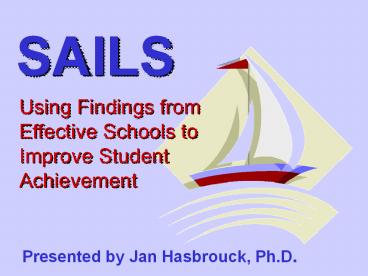Assessment/Progress Monitoring: Using Informal Reading Inventories (IRIs) - PowerPoint PPT Presentation
1 / 31
Title:
Assessment/Progress Monitoring: Using Informal Reading Inventories (IRIs)
Description:
S TANDARDS A SSESSMENTS I NSTRUCTION & INTERVENTION L EADERSHIP S YSTEM-WIDE COMMITMENT Hasbrouck & Denton (2005) Did the student make progress toward standards? – PowerPoint PPT presentation
Number of Views:66
Avg rating:3.0/5.0
Title: Assessment/Progress Monitoring: Using Informal Reading Inventories (IRIs)
1
SAILS
Using Findings from Effective Schools to Improve
Student Achievement
Presented by Jan Hasbrouck, Ph.D.
2
Word of the Decade?
accountability!
3
(No Transcript)
4
Our school is ready to make some serious
improvements in our instructional program
So how do we get there?
5
EFFECTIVE SCHOOLS RESEARCH
90 Academic Success
Highly Effective School
Few Challenges
6
EFFECTIVE SCHOOLS RESEARCH
Highly Effective School
Many Challenges
7
GOOD NEWS!
We have LOTS of effective schools research!!
8
EFFECTIVE SCHOOLS RESEARCH
Making Schools Work Douglas Reeves
90/90/90 Schools
- Kathleen Cotton
- www.nwrel.org
9
BAD NEWS
We have LOTS of effective schools research!!
10
Set your SAILS for success!
S TANDARDS A SSESSMENTS I NSTRUCTION
INTERVENTION L EADERSHIP S YSTEM-WIDE COMMITMENT
Hasbrouck Denton (2005)
11
STANDARDS
- Apply grade level expectations for what students
should know and be able to do at key benchmarks - Use standards to set high performance goals for
ALL students
12
ASSESSMENTS
- Assess to
- screen
- diagnose
- continuously evaluate
- measure the outcomes
- of students skills and performance
13
ASSESSMENTS
- Benchmark/Screening
- Which students MAY need extra assistance?
- Diagnostic
- What are a students skills
strengths needs? - Progress Monitoring
- Is learning happening?
- Outcome
Did the student make progress toward standards?
14
ASSESSMENTS
- Assess to
- screen
- diagnose
- continuously evaluate
- measure the outcomes
USE results to make all key instructional
decisions! Share data in frequent, public,
nonjudgmental, collaborative meetings
15
INSTRUCTION INTERVENTION
- Plan and deliver lessons and interventions
designed to meet the identified needs of ALL
students, at all ability and skill levels - Use validated, effective instructional materials
strategies - Effectively organize manage the
classroom environment
16
LEADERSHIP
- Provide VISION, GUIDANCE SUPPORT
to insure that - (a) effective instruction and interventions
designed to meet standards are implemented for
ALL students - (b) instructional decisions are based on
continuous assessment data - (c) focused sustained professional development
provided to support S-A-I
17
SYSTEM-WIDE COMMITMENT
- Adopt a system-wide no excuses model that
partners administrators, teachers, parents and
staff to help ALL students achieve success
Unless we - Encourage and support collaboration across
classrooms, special programs, and home
18
ALL 5 Elements
of S-A-I-L-S must be incorporated into a schools
instructional system to ensure that ALL students
achieve success
SAILS must be launched into a
safe and positive school environment
19
SAILS Needs Assessment
Indicator Low Need Some Need High Need
S tandards A ssessments I nstruction Intervention L eadership S ustained Commitment
20
- Self Evaluation for
- STANDARDS
- Are all teachers, administrators specialists
aware of state standards benchmarks? - Are instructional materials aligned with
standards? - Are teachers using standards benchmarks for
planning instruction interventions, evaluations
setting IEP goals?
21
- Self Evaluation for ASSESSMENTS
- Are teachers, administrators,
specialists aware of different types
and purposes of
assessments? - Do teachers specialists know when
how to administer different types of
assessments? - Do teachers specialists have sufficient
assessment materials? - Do teachers specialists know how to use
assessment results for making instructional
decisions?
22
- Self Evaluation for INSTRUCTION INTERVENTION
- Are teachers, administrators, and specialists
aware of the multi-tiered instructional model
RTI? - Do teachers specialists know how to teach
oral language, phonemic
awareness, phonics/decoding, fluency, vocabulary,
comprehension, writing spelling skills
appropriately for grade instructional need?
23
- Self Evaluation for INSTRUCTION
INTERVENTION - Do teachers specialists know how to
use core supplementary
materials? - Do teachers know how to differentiate
instruction to meet the differing needs of
students (grouping providing Tier II instruction
in the classroom increasing instructional
intensity)? - Does a reading schedule need to be developed?
- Does the district have a program roadmap for
using instructional materials?
24
- Self Evaluation for LEADERSHIP
- Are building district leaders AWARE of the
key elements of effective schools? - Are leaders creating and communicating a clear
VISION of the results to be obtained from
improved instructional outcomes? - Are leaders providing the necessary GUIDANCE
SUPPORT including focused and sustained
professional development to teachers and
specialists?
25
- Self Evaluation for SUSTAINED SYSTEM-WIDE
COMMITMENT - Do all participants embrace a NO EXCUSES
attitude? - Are plans in place or being developed to
SUSTAIN the successes achieved through S-A-I? - Are teachers, specialists, coaches, etc. being
given the TIME SUPPORT necessary for the
increased COLLABORATION that improved
instructional outcomes will require ?
26
Our school is ready to make some serious
improvements in our instructional program
So how do we get there?
27
Set your SAILS for success!
S TANDARDS A SSESSMENTS I NSTRUCTION
INTERVENTION L EADERSHIP S YSTEM-WIDE COMMITMENT
Hasbrouck Denton (2005)
28
- Lets all work TOGETHER
to help every student
achieve success!
29
REFERENCES Cotton, K. (1995). Schooling
Practices that Matter Most. NWREL.
www.nwrel.org Gibson, V., Hasbrouck, J.
Denton, C. (2007). Differentiating Instruction
Grouping for Success New York McGraw-Hill
Higher Education Hasbrouck, J. Denton, C.
(2005). The Reading Coach A How-to Manual for
Success Longmont, CO Sopris West
30
- Reeves, D. Making Standards Work 3rd Ed.
Denver Advanced Learning Press. - Sprick, Randy colleagues
- Safe Civil Schools www.safeandcivilschools.com
- Interventions
- Teachers Encyclopedia of Behavior Management
100 Problems/500 Plans
31
Contact Information Jan Hasbrouck, Ph.D. JH
Consulting Seattle, WA www.jhasbrouck.com






























